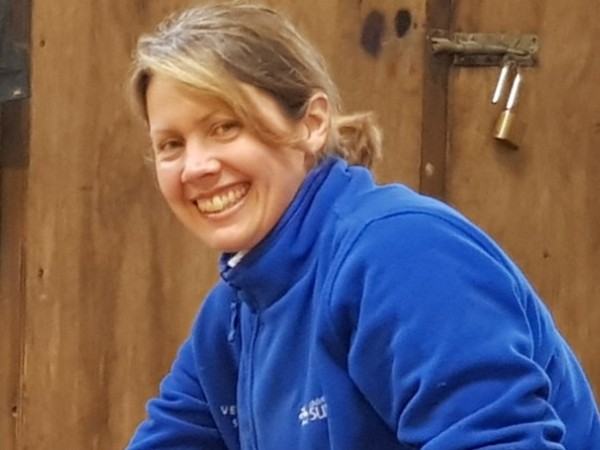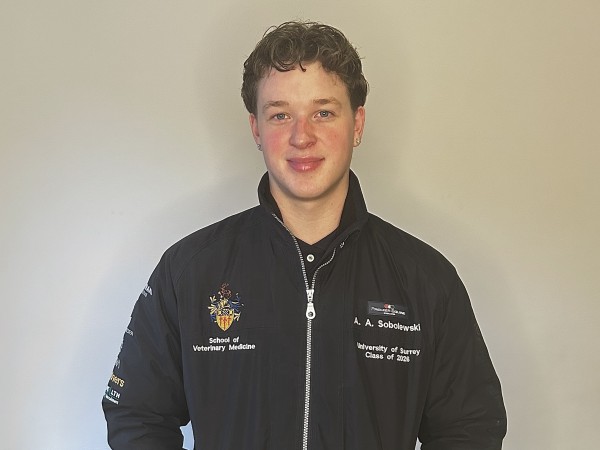
Emma Taylor
"My PhD has allowed me to visit countries endemic for rabies, meet those most at risk of exposure to the disease, and hear first-hand about the socioeconomic constraints and challenges that face these communities."
Course
Veterinary Medicine and Science PhDResearch project
Efficient risk management of One Health approaches: a portfolio analytic suite applied to rabies
Why I chose Surrey
Before starting my PhD, I studied my veterinary microbiology masters at Surrey and was already familiar with the campus and resources available. Something that particularly impressed me was the supportive and inclusive, student-centred approach to teaching, so I knew the PhD environment would be the same. Completing a PhD was an ideal opportunity for me to apply my microbiology expertise gained to disease control, by undertaking high quality research on zoonotic disease.
My research project
My research project, funded by the University’s Doctoral College Studentship Award, investigates rabies transmission in dogs. The global burden of rabies is staggering, especially as it’s a preventable disease. One of the key reasons for the limited success of elimination programmes are the differing epidemiological characteristics of the outbreaks. To improve the allocation of the limited resources in rabies endemic countries and to eliminate dog rabies, there’s a need for better epidemiological information.
My project uses state-of-the-art mathematical modelling approaches to capture the transmission dynamics of rabies among dogs and human behaviour, in efforts to create a new decision support tool. Although these have been modelled individually in the past, coupling disease dynamics with economic evaluation models had never been attempted. My aim is to apply this tool and help reduce human lives lost due to rabies, limit wastage of post-exposure prophylaxis and lessen the unnecessary suffering of dogs caused by the disease.
My supervisor, Dr Dan Horton, has provided unconditional support to help me achieve my objectives. He’s given me a learning environment where I feel confident to express new ideas and any difficulties I may have. Our weekly and monthly meetings give me dedicated time to discuss my progress and set manageable targets to achieve.
I’ve been fortunate to have inter-departmental and cross-departmental collaborative opportunities at the University. These collaborations have helped me progress my research into a truly multidisciplinary project.
I’ve wholeheartedly enjoyed my experience as a PhD researcher and particularly enjoy the autonomy that independent research gives me.
"My project uses state-of-the-art mathematical modelling approaches to capture the transmission dynamics of rabies among dogs and human behaviour, in efforts to create a new decision support tool."
My life at Surrey
Guildford is the perfect balance of busy and calm. There’re great amenities in the town centre and you have the countryside right on your doorstep. It’s also ideal for getting into London or heading to the south coast.
My career and development
My PhD has allowed me to visit countries endemic for rabies, meet those most at risk of exposure to the disease, and hear first-hand about the socioeconomic constraints and challenges that face these communities. I’ve also had the opportunity to network with other researchers and academics working on neglected diseases, discussing my research with them, and presenting my findings at national and international conferences. The publications I’ve produced have allowed my research to reach a wide demographic and create a name for myself within the area of rabies research.
Throughout my research project, I’ve received continued and consistent support from my supervisors, who’ve given m honest and trustworthy advice on career options. I’ve also benefited from the courses and drop-in sessions of offer at the Doctoral College.
Once I finish my PhD, I hope to continue my career in academia, with a post-doctoral position.
My advice
Meet your supervisors as much as you can. These individuals will be part of your PhD journey for at least three years and it is imperative that they meet your needs as a researcher. I’d also advise meeting other PhD students who work with or have worked with your prospective supervisors – they’ll give you their honest opinions!

